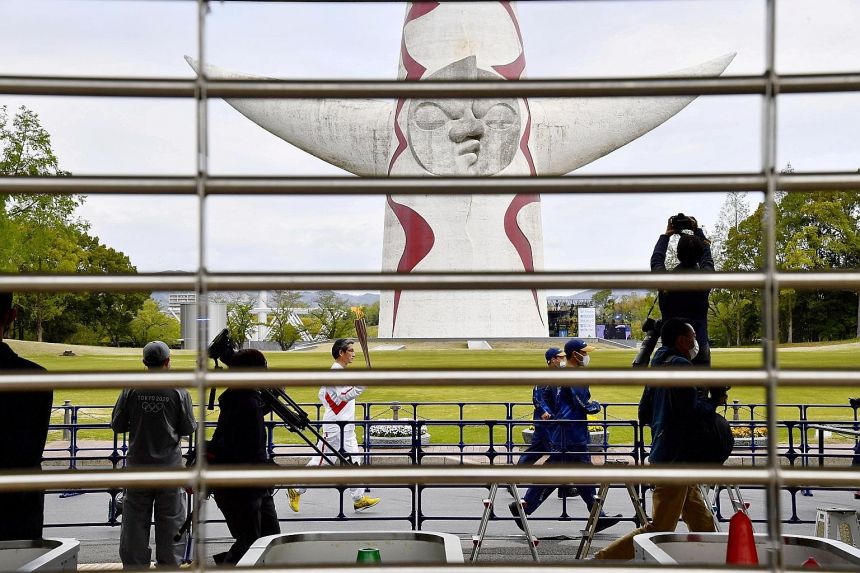Japan fighting to save Olympics as it expands emergency Covid-19 curbs
Sign up now: Get ST's newsletters delivered to your inbox

A Tokyo Olympics torch relay runner at the Expo '70 Commemorative Park in Osaka on April 13, 2021.
PHOTO: REUTERS
Follow topic:
TOKYO - Japan expanded quasi-emergency measures to four more prefectures on Friday (April 16), bringing the total to 10, raising questions over whether the Olympics can really proceed on schedule in under 100 days.
The fate of the Games lies on whether Covid-19 can be brought under control soon enough in the country and will affect issues like delegation sizes, athlete visas, and the necessary countermeasures against the coronavirus.
"We're not thinking of cancelling the Olympics," Tokyo 2020 president Seiko Hashimoto said on Friday (April 16). "We will continue to do what we can to implement a thorough safety regimen that will make people feel complete safety."
This comes a day after the ruling Liberal Democratic Party's second-in-command, Mr Toshihiro Nikai - in a rare breakaway from the government line - said that cancellation is always an option. He said: "What would be the point of an Olympics that spread the infection?"
Experts are warning of the risks of the Games going down in history as a super-spreader event, instead of the much-hoped-for symbol of triumph over Covid-19.
The British Medical Journal this week published an article by four doctors, three of whom are Japanese, who said: "Holding Tokyo 2020 for domestic political and economic purposes - ignoring scientific and moral imperatives - is contradictory to Japan's commitment to global health and human security."
The doctors added: "Despite its poor performance, Japan still invokes exceptionalism."
Patience is fast running out. The pro-government Yomiuri newspaper, in an unusually blunt editorial yesterday, said the fourth wave "cannot be said to have been unexpected" and pinpointed a "failure to find effective solutions".
Indeed, the path to the Games is riddled with potholes.
Only 0.93 per cent of Japan's population have received at least their first inoculation dose as at Thursday, as supplies are affected by factors like the government's slow approval of the vaccine.
Prime Minister Yoshihide Suga reportedly will make a personal appeal for more vaccines to Pfizer chief executive officer Albert Bourla on Saturday. Mr Suga is in Washington for a summit with United States President Joe Biden.
Fears are, in the meantime, mounting over the spread of mutant strains that the authorities are warning are more infectious and more likely to cause severe symptoms.
The British N501Y variant is now dominant in the western areas of Japan like Osaka, which logged 1,209 cases on Friday, the fourth straight day it has had to reset its one-day high. There are now more severely ill patients in Osaka than hospital beds available for them.
Elsewhere, in areas like Tokyo and Okinawa, the strain wreaking havoc is the E484K mutation that was first identified in South Africa and Brazil and is said to be more resistant to vaccines.
Tokyo Governor Yuriko Koike on Friday explicitly called for outsiders "not to enter the city".
The quasi-emergency measures - now in effect in Tokyo, Osaka, Kyoto, Hyogo, Miyagi and Okinawa - were expanded to Tokyo's neighbouring prefectures of Saitama, Kanagawa and Chiba, as well as Aichi in central Japan. They will take effect from April 20 to May 11.
Meanwhile, Ehime in western Japan on Friday said it wanted to be covered by the quasi-emergency, which medical experts have recommended should be expanded to Osaka's neighbour Nara and Fukuoka in the south-west.
Japan logged just 600 cases nationwide on March 8 but reported 4,532 cases on Friday, the third straight day of the figure breaching the 4,000 mark.

